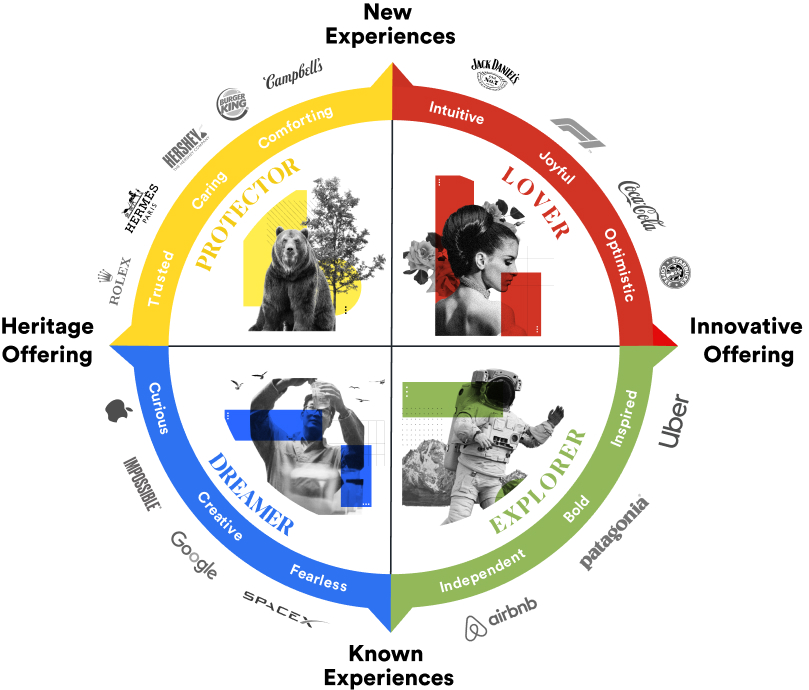Would you describe Google as smart? SpaceX as bold and fearless? Hershey’s as an old friend?

Chances are, the brands you like have distinct, human-like traits. When you think of them, it’s like thinking of someone you know and like– they’re funny, reliable, comforting, exciting, or a whole host of other things. When you engage with them, you’re not just buying something. You feel like you’re connecting to a much bigger feeling.
Companies aren’t people. But successful brands make us feel like they are.
Powerful brands know who they are and speak it loud and clear, elevating transactions to meaningful connections. Successful brands have personality.
Knowing and expressing your brand personality means you’ll communicate beyond words. Connect directly to your customers’ hearts and minds.
This month, as we launch our new Brand Personality Quiz, we’re talking about the importance of personality in branding. What does it mean? How can you tap into it? Read on to find out.
What is Brand Personality?
At Flux, we see personality as the secret ingredient to branding. Without personality, there’s no flavor. We think it’s so important, we’ve developed an assessment to tell you all about your brand personality in just 6 questions. It’s what informs all the decisions your brand makes– how you speak, how you look, how you act. But what exactly is a brand personality?
Brand personality refers to a set of human traits and characteristics that are attributed to a brand. Just like people, brands use particular personality traits that help us understand who they are and what they’re all about. A brand personality is a way of defining the written and visual tone of a brand in human terms, and helps to create a human-like identity for the brand.
Your brand personality is something you sense innately about your own brand, simply based on the experience you give your customers and the kinds of services you offer. For example, a bank usually won’t be fun and silly, but will have a personality that feels trustworthy, safe, and formal. If your company is customer-centric and friendly, your personality might be more cheerful, upbeat, and casual.
All brands have a personality– but not all of them communicate it effectively across the many facets of their brand experience.

Why You Need a Brand Personality
Brands that have a well-defined personality create a deeper connection with their customers because they communicate a unique and recognizable identity that customers can relate to and feel emotionally connected to. A brand’s personality reflects its values, attitudes, and beliefs, and it humanizes the brand, making it more relatable and appealing to customers.
When customers feel that they share similar values and beliefs with a brand, they are more likely to form a bond with that brand, making their relationship more meaningful and long-lasting. A strong brand personality can also create an emotional connection by appealing to customers’ desires and emotions, whether it’s through creating a sense of security and stability, or by inspiring customers to pursue their dreams and reach their full potential.
But a brand personality isn’t just for your customers. It’s also for your competitors, your employees, and your stakeholders. Having a strong brand personality is important for a number of reasons:
Differentiation: A well-defined brand personality helps to differentiate a brand from its competitors and sets it apart in the market. This makes it easier for customers to identify and remember the brand, and can help to create a competitive advantage.
Emotional connection: A brand personality helps to establish an emotional connection with customers by creating a human-like personality for the brand. This emotional connection can lead to increased loyalty and a stronger bond between the brand and its customers. They aren’t just buying– they’re connecting.
Consistency: A strong brand personality provides consistency in the brand’s messaging and communication, making it easier for customers to recognize and remember the brand across all touchpoints. It also makes it easier for your marketing, branding, and social media teams to all stay on the same page, speaking with the same voice no matter where your brand shows up.
Credibility: A well-defined brand personality can help to build trust and credibility with customers by demonstrating the brand’s commitment to its values and identity. When you are authentically yourself, your customers take notice.
Marketing: A strong brand personality creates the foundation for creative campaigns that effectively target and engage with specific customer segments. And it’s not just that brands with personality engage more effectively with their audiences, it’s also that having a well-defined personality could save you tons of money in your marketing budget. When your personality is clear, your team knows who you are and how you show up, taking much of the guesswork out of creative campaign creation and streamlining the process. You won’t be getting the question, “Would our brand say that?”
How To Develop Your Brand Personality
Developing a strong brand personality requires a thoughtful and strategic approach. To express your brand personality, your brand adopts specific traits in visual, written, and experiential communication. But before you do, you need a deep and authentic understanding of what you do and why you do it. To uncover your brand personality, you’ll need to take several steps:
Conduct market research: Start by understanding your target audience, what they want and need, and what they look for in a brand. This information will help you identify the traits and characteristics that your target audience values and that can be incorporated into your brand personality. Ensure you also have a clear understanding of your competitors– you don’t want a personality that sounds exactly like everyone else.
Define your brand values: Clearly define the values that your brand stands for. What is your mission? What are you committed to? Why do you do what you do? Your brand values will shape the personality of your brand and help to guide your decisions.
Determine your brand voice: Decide on the tone and language that your brand will use in its communication. This voice should be consistent across all touchpoints, including your website, social media, advertising, and customer service. If you’re committed to brightening people’s lives, perhaps your voice is funny and cheerful. If you’re committed to protecting people from harm, perhaps your voice is serious and knowledgeable. Whatever you choose, it’s important that it comes from a deep understanding of your personality.
Create a visual identity: Develop a visual identity that reflects your brand personality. This can include things such as a logo, color palette, and typography. Your visual identity should be consistent with your brand personality and values– a brand that’s happy and easy probably wouldn’t use dark, moody colors. The brain processes images before words, so the visual tone of your personality is just as important as the voice.
Integrate your brand personality into everything you do: Your brand personality should be integrated into everything you do, from your products and services to your customer service and marketing efforts. This helps to reinforce your brand personality and ensure consistency in your messaging and communication. Let your personality inform your campaigns, not the other way around.
These aren’t easy steps– each one takes time, resources, and strategic thinking. But the revenue you’ll generate with a strong brand personality more than pays back the effort. If you’re not sure where to start, our Brand Personality Quiz is a great place to begin– you’ll find out your personality in just six questions, and get concrete tools for bringing it to the world.

The Brand Personality Quiz
We think personality is so important, we’ve created an assessment to help more brands get in touch with their personality. After working with hundreds of brands across industries, we’ve found that there are four major brand personality types. Each type can effectively tap into particular personality traits to inspire action and loyalty. Below is a graphic representation of how the personality types and their traits work together, with example brands.

The axes of the wheel represent two critical dimensions of every brand: the offering and the experience. How you answer the questions in the Brand Personality Quiz place your brand on the X and Y axes, determining your brand personality type.
Horizontal Axis = OFFERING
The offering is your product or service. Is your offering historic and recognizable, or is it totally new in the market?
Heritage Offering: Established and familiar products and services (example: Rolex watches)
Innovative Offering: Products and services that disrupt the market or have never been seen before (example: iPhone)
Vertical Axis = EXPERIENCE
The brand experience is what happens when someone engages with your offerings and services. Is the experience you offer to customers familiar and expected, or new and/or constantly changing?
New Experiences: Customers are drawn to your brand because it helps them discover new things about themselves and the world (example: Google)
Known Experiences: Customers are drawn to your brand because it is comforting, nostalgic, or trusted (example: Campbell’s Soup)
The 4 Quadrants = PERSONALITY TYPES
Where a brand falls on the axes places it into one of four quadrants, each representing a particular brand personality type. There are four main types of brand personalities: Dreamer, Protector, Explorer, and Lover. Each of these personalities appeals to different emotions and desires, allowing brands to connect with their target audience in a unique and meaningful way.

Dreamer brands are creative and innovative, always looking for new and exciting ways to do things. They create a sense of transformation and change, appealing to customers who are looking for new experiences and a sense of novelty. Apple is an example of a dreamer brand, with its bold marketing campaigns and innovative products that introduce us to completely new realities.

Protector brands provide stability and comfort, offering trusted and familiar products and services to established markets. They create a sense of nostalgia and security, appealing to customers who value reliability and tradition. Johnson & Johnson is an example of a protector brand, known for its high-quality products that help people care for their families and maintain a healthy lifestyle.

Explorer brands are disruptors, taking familiar products and services and doing them better. They create a sense of excitement and adventure, appealing to customers who are looking for something new and innovative. Tesla is an example of an explorer brand, known for its electric vehicles that are changing the way people think about transportation.

Lover brands are warm and nurturing, helping customers to discover new things about themselves and the world. They create a sense of belonging, happiness, and possibility, appealing to customers who are looking for a sense of community and a connection to something greater. Coca-Cola is an example of a lover brand, known for its cheerful marketing campaigns that bring people together and spread happiness.
The quiz is an easy way to understand your brand personality type in just six questions. You’ll get immediate results, and a customized report that will give you concrete strategies for communicating your personality to the world.

Personality is Everything
Personality is the key to infusing your brand with humanity. The result is a much deeper affinity that goes beyond a particular offering or price point. That’s the magic behind branding: a clear personality elevates a transaction to a connection, making it much more meaningful, inspiring action and forging loyalty.
When brands show their personalities, they make clear statements about who they are and what they believe. But if the story doesn’t feel real, the spell is broken. Brands must be authentic in order for us to believe.
Uncovering your authentic personality and speaking it clearly can be a challenge. It’s what branding specialists do– bring out your brand personality and communicate it to the world.
Our brand personality quiz pinpoints your core brand personality, then gives you specific traits you can use to craft campaigns that resonate. Get the tools that will help you connect on a level deeper than words– speak directly to your customers’ hearts.
When you’re ready to start a project with us, just get in touch. We’re honored to be part of your brand’s journey.